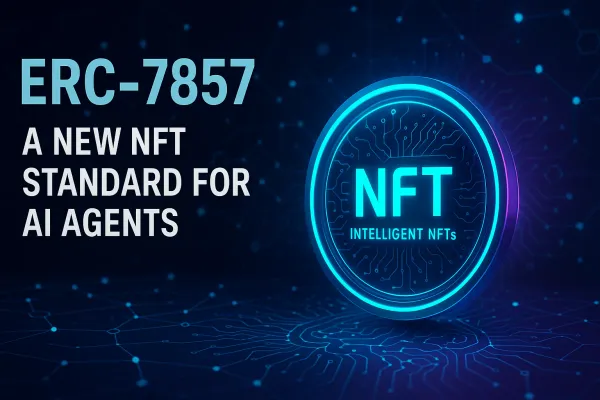ElizaOS: The Operating System for AI Agents

What is ElizaOS?
ElizaOS is founded by Shaw, one of the co-founders of $ai16zdao. It is a lightweight, open-source AI agent development framework that enables the creation, deployment, and management of autonomous AI agents. ElizaOS targets AI agents and autonomous systems exclusively, contrary to other operating frameworks that are resource-heavy and centralized. It was built to be highly efficient, easily scalable, and adaptable to many different fields. ElizaOS is a cut above others as it is capable of running effortlessly on edge devices as well as large-scale distributed systems.
The ElizaOS framework supports developers and innovators by working towards enabling privacy, security, and efficiency while working with autonomous agents. ElizaOS has a strong advantage because of its large TypeScript community, and has gained over 12000 stars on GitHub. Because of all these factors, it accounts for about 60% of the current web3 AI agent development market. The framework is designed in a manner which fosters a community that is focused on ElizaOS’s core values of decentralization, resource optimization, and modularity.
ElizaOS Architecture and Its Capabilities
The modular structure is what sets ElizaOS apart as developers can assemble and disassemble the system as per requirements. This guarantees the optimum efficiency of the system for the specific task at hand. For example, instead of including fluff features, ElizaOS can be set up to solely revolve around essential ones such as data processing, task automation, and even real time decision making.
Its ability to seamlessly fit into varying development platforms differentiates it from other operating systems. ElizaOS is designed to fully support the industry-leading languages such as JavaScript and TypeScript. This is done not only to lower the entry threshold for new developers, but also to fit into the existing knowledge base of a large section of the industry.. This will ensure an increased adoption rate and facilitate the developers to spend more time innovating rather than dealing with potential learning challenges.
ElizaOS was designed for other environments to which IoT edge devices like sensors, drones, and smart home systems would be able to operate in. Within such a system, drones and smart sensors would conserve much more energy through the integration of ElizaOS because they would not have to perform additional computational tasks as they usually do with IoT computation. Traditional operating systems, on the other hand, utilized a lot more resources and are not optimized for efficiency. These systems, such as drones and smart home sensors, would be able to conserve a lot of energy with ElizaOS integrated, making it highly effective in any industrial field, whether it be healthcare or logistics.
ElizaOS also excels in scalability, an essential feature for the evolving demands of AI and decentralized ecosystems. Whether deployed on a single device or across a network of interconnected systems, ElizaOS maintains consistent performance. This scalability ensures that as projects grow in complexity or user base, the operating system can scale alongside them without requiring significant architectural overhauls.
In terms of capabilities, ElizaOS is designed to facilitate sophisticated agent behaviors. It enables developers to create agents capable of autonomous decision-making, data processing, and interaction. The system’s built-in support for memory management and asynchronous task execution allows agents to handle complex workflows efficiently. Additionally, its architecture supports real-time adaptability, ensuring that agents can respond dynamically to changing conditions or user inputs.
Security is another cornerstone of ElizaOS. By incorporating advanced mechanisms for data integrity and secure interactions, it ensures that sensitive information is handled safely. This is particularly crucial in applications involving financial transactions, healthcare data, or other privacy-critical domains. The system’s emphasis on secure execution environments provides an additional layer of trust for developers and users alike.
ElizaOS’s developer-first approach is evident in its commitment to providing accessible tools and comprehensive documentation. Developers are empowered to quickly prototype, test, and deploy solutions without being bogged down by excessive complexity. The streamlined development process supports innovation and reduces time-to-market for new applications.
Use Cases
ElizaOS offers a wide range of potential use cases, thanks to its modular structure, flexibility, and versatility. With extensive plugin support, ElizaOS enables innovative solutions such as AI-powered applications, DeFi integrations, and autonomous agents. Below, you can find a list of some of the plugins available in ElizaOS.
ElizaOS’s capabilities are particularly prominent in the DeFi space. For instance, an Eliza bot equipped with dynamic liquidity management systems can automatically detect arbitrage opportunities and execute trades on behalf of the user. By collaborating with projects like Meteora, Orca, and Dynamic Liquidity Market Maker (DLMM), ElizaOS adapts quickly to token fluctuations, optimizing profits. This allows users to safely manage their investments while simplifying the complexity of DeFi.
The extensive blockchain plugin ecosystem of ElizaOS supports operations across networks like Solana, Ethereum, Avalanche, NEAR, StarkNet, and zkSync. For example, the plugin-solana allows seamless integration with Solana’s DeFi ecosystem, enabling token swaps and yield farming strategies. Similarly, plugin-evm provides support for Ethereum and other EVM-compatible blockchains, facilitating cross-chain operations—a crucial advantage for multi-chain projects.
ElizaOS demonstrates its versatility beyond DeFi by excelling in autonomous agent systems, social media interactions, and commercial operations. These agents can efficiently engage with users on platforms like Discord, Twitter, and Telegram by running giveaways, providing support, and managing interactions seamlessly. With its robust character-based social media integrations, ElizaOS enables the creation of unique personas that actively participate on platforms such as Twitter. For example, an ElizaOS-powered character can post thematic tweets regularly, interact with users through automated replies, and generate tailored content for specific campaigns or events. These features not only simplify social media management but also make it more engaging, significantly enhancing community involvement and interaction.
These agents are not limited to user interaction but also play an instrumental role in decision-making processes within DAOs. For instance, during a DAO voting process, autonomous agents can provide data-driven insights, enabling more informed decision-making.
ElizaOS agents can also manage the creation and operation of NFT collections. With the appropriate plugins, NFTs can be created and managed seamlessly within ecosystems like Solana and Ethereum.
While these use cases highlight ElizaOS’s potential within the Web3 ecosystem, its applications extend far beyond. For example, WhatsApp integration allows users to create personalized messaging bots, automating customer support and engagement processes. TEE (Trusted Execution Environment) integration enables secure transactions and data protection, allowing sensitive information to be processed safely. Real-time weather integration supports applications that rely on accurate predictions—for instance, energy management systems optimizing consumption based on weather conditions. Furthermore, web search integration enables ElizaOS-based applications to gather information efficiently, simplifying access to relevant data for users.
ElizaOS-powered autonomous agents span a wide range of integrations, including DeFi, social media management, NFT creation, web search, WhatsApp, and TEE. These integrations enable the creation of highly capable agents across diverse domains. With its broad plugin ecosystem, ElizaOS unlocks vast possibilities for developers, offering a flexible and dynamic environment to bring innovative projects to life.
ElizaOS’ Role in the Future of AI
ElizaOS has the potential to play a significant role in the future of artificial intelligence. But how? As AI systems become increasingly complex, achieving AGI (Artificial General Intelligence)—an intelligence akin to human cognition—will likely require more than a single model or system. Instead, collaboration and interaction between multiple independent agents will be essential. This is where ElizaOS stands out, offering features designed to enable such interaction and cooperation.
Its open-source nature and efficiency in data and model management provide clear answers as to why ElizaOS could lead the way in the future of AI. In AI systems, data collection and cleaning are often among the most significant challenges. ElizaOS simplifies these processes, allowing developers to focus on building their projects rather than spending excessive time managing data. This enables developers to create more personalized, user-oriented solutions without being restricted by the limitations of large-scale AI models.
Recent developments in the cryptocurrency and Web3 ecosystem further highlight the relevance of ElizaOS’s capabilities and features. AI agents’ ability to play critical roles in trending areas, such as memecoins, and perform autonomous operations opens up new opportunities. Whether making investment decisions, accessing DeFi protocols, or executing real-time transactions on behalf of users, the infrastructure provided by ElizaOS showcases its strength and flexibility.
Another critical factor is community support. ElizaOS is gaining global traction, particularly due to the interest of developer communities in Asia. Autonomous agents developed with ElizaOS introduce innovative ideas and further enhance the project’s potential. With its open-source approach, strong community backing, lightweight and modular architecture, ElizaOS is poised to become a prominent name in shaping the future of AI.
Vexom AI Powered by ElizaOS
Vexom AI leverages ElizaOS, the lightweight and open-source AI agent operating system. ElizaOS streamlines the development, deployment, and management of autonomous AI agents, empowering Vexom AI to deliver secure, scalable, and user friendly blockchain interactions. With ElizaOS integration, Vexom AI users effortlessly perform DeFi transactions, manage NFTs, engage in staking, and handle token management through intuitive natural language commands—benefiting from an advanced AI powered infrastructure.
Discover more about Vexom AI and explore a simplified Web3 experience today!
Conclusion
ElizaOS is the first of its kind in the development of autonomous systems as it interrelates AI in the traditional sense with the expectations of a fully autonomous system. ElizaOS is exceptionally friendly to developers because of its open-source and modular architecture that make it easy to build powerful AI agents that operate in a variety of contexts - from edge devices to Web3 systems, which are becoming increasingly complex.
The system’s emphasis on decentralization, efficiency, and scalability makes it uniquely suited for tackling the growing complexity of AI and blockchain integration. By reducing barriers for developers and offering a robust framework for innovation, ElizaOS empowers the creation of agents that can drive financial automation in DeFi, enhance user experiences on social media, manage NFT ecosystems, and even extend into non-Web3 applications like secure data processing, real-time analytics, and personalized messaging.
As the AI landscape evolves, ElizaOS is well-positioned to become a foundational tool for achieving collaborative intelligence. Its ability to foster interaction among multiple agents highlights its potential role in the pursuit of Artificial General Intelligence. With strong community support, continuous innovation, and a focus on practical usability, ElizaOS is set to shape the future of AI and decentralized technologies, unlocking new possibilities for developers and users alike.





